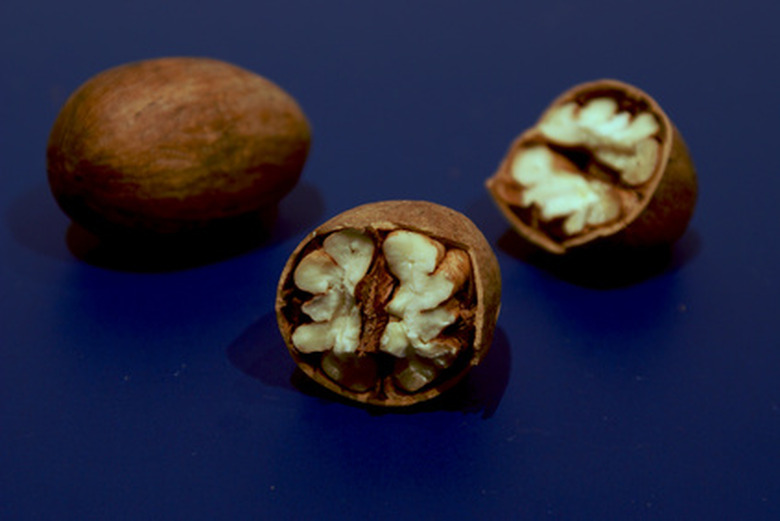Organic Fertilizer For Pecan Trees
Pecan trees produce pecans. Production of nuts is determined by the number and size of the leaves required to support development of that nut. Typically, 10 compound leaves, each with nine to 13 leaflets, are required to support a single pecan. Healthy trees with plenty of foliage are necessary to sustain a good crop. Organic growers or those wanting to use organic practices are limited to organic fertilizers to provide the nutrients needed to sustain that leaf growth.
Fertilizer
Fertilizer is a means of restoring any of the 16 different nutrients to the soil that plants need in order to survive. These nutrients can be lacking because of previous crops, soil type and location, leaching and other circumstances. Fertilizer replaces these nutrients either synthetically through chemicals processed into commercial fertilizer or through organic fertilizer materials. Pecans typically need nitrogen because it contributes to leaf growth, sometimes zinc and depending on soil conditions, other trace minerals.
- Pecan trees produce pecans.
- Pecans typically need nitrogen because it contributes to leaf growth, sometimes zinc and depending on soil conditions, other trace minerals.
Sources
Organic fertilizer has come from a living thing or was once a living thing. It can be either plant or animal based. Some animal sources would be different animal manures like dairy, poultry, pig or horse. These need to be sufficiently aged in order to break down the ammonia and other negative components in the manure before it can be applied to soil. Plant matter might include dried leaves, grass clippings, straw, animal bedding like sawdust that is untreated, peanut shells and pine needles. Fish meal, bone meal and soybean meal are also acceptable sources. Manures and composts are commonly used to fertilize organic pecan trees because they contain high amounts of nitrogen. Commercially prepared organic fertilizers are available.
- Organic fertilizer has come from a living thing or was once a living thing.
- Manures and composts are commonly used to fertilize organic pecan trees because they contain high amounts of nitrogen.
Soil Test
Before planting pecan trees or prior to fertilizing existing ones, it is a good idea to have a soil test performed. These are done by collecting samples from the area and taking them to your local extension office. An analysis will be done and you will receive the test results. These results will show the pH of the soil and any nutritional deficiencies. The extension office representatives will be able to advise what fertilizers should be added to your soil.
Application
Because nuts are harvested from the ground, it presents health risks for the nuts to come in contact with manures that are still raw. Animal manures and composts containing them must be used no less than 120 days prior to harvest. The organic fertilizer should also be tested to determine the nitrogen content. This helps you know how much to apply. Once you have the correct analysis, fertilizers can be applied. For new pecan tree plantings, fertilizer should be worked into the soil at least one year prior to planting. For established trees, it should be side-dressed around the trunk and worked into the top 4 to 6 inches of soil. Be sure not to let fertilizer come in contact with the trunk, as this can cause burning.
- Before planting pecan trees or prior to fertilizing existing ones, it is a good idea to have a soil test performed.
- For new pecan tree plantings, fertilizer should be worked into the soil at least one year prior to planting.
Benefits
Benefits of organic fertilizer include lower cost and lack of chemical content. Because the sources of organic fertilizer are living things, they tend to be readily available, perhaps even on your own property or that of neighbors. People are often happy to get rid of animal manures for free. Compost can also be made at home for relatively little cost. Both manures and compost just need time to decompose before they can be used. Lack of synthetic components means greener living for the tree, you and the environment.
Disadvantages
Organic fertilizers are more difficult to apply because they require more physical labor to spread or blend in to the soil. It also impossible to know the nutrient composition without testing. Synthetic fertilizers are clearly labeled with the analysis. Organic fertilizers take longer to break down in the soil into a usable form for the pecan trees than synthetic fertilizers do.
- Benefits of organic fertilizer include lower cost and lack of chemical content.
- Organic fertilizers are more difficult to apply because they require more physical labor to spread or blend in to the soil.
